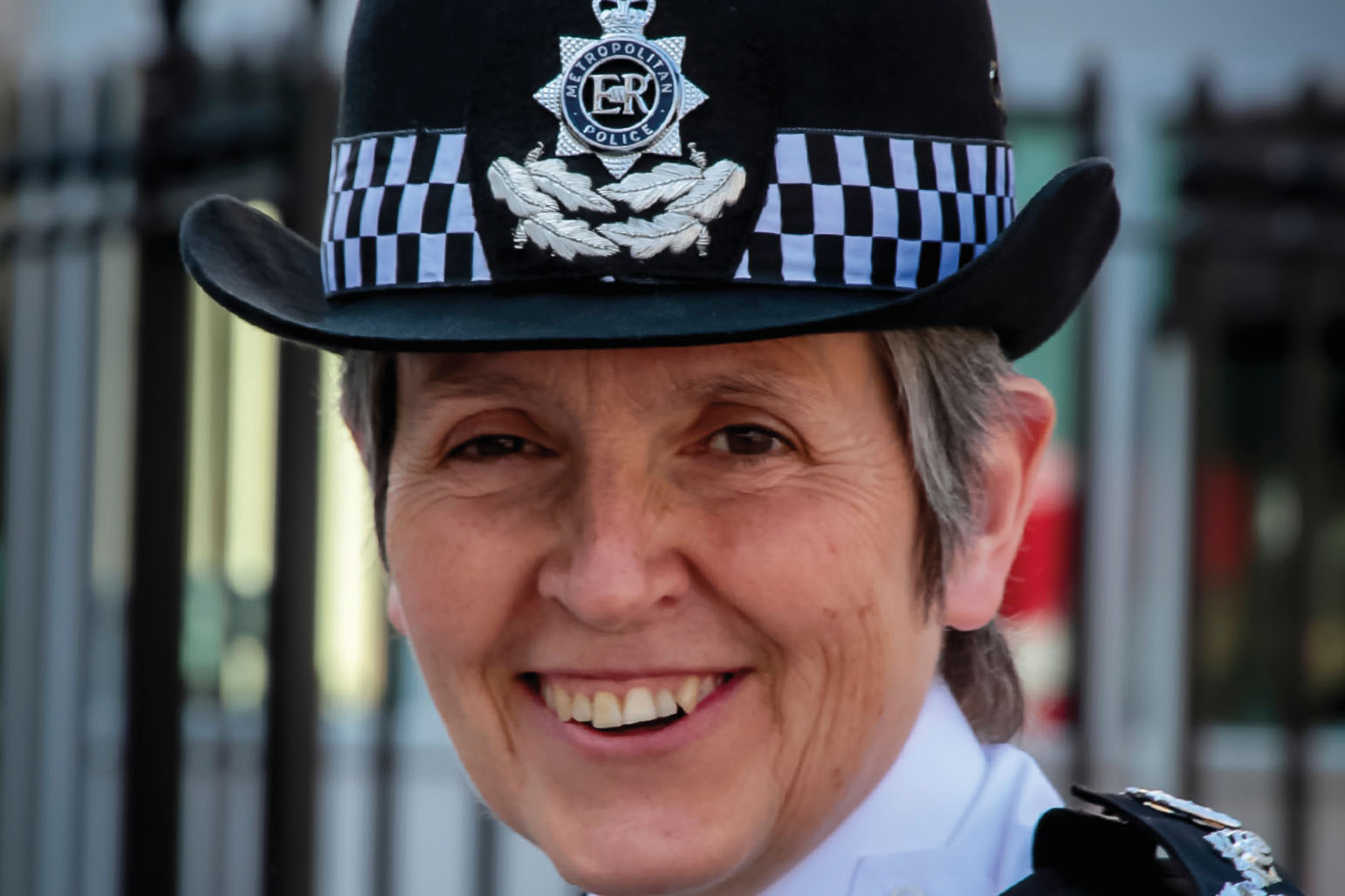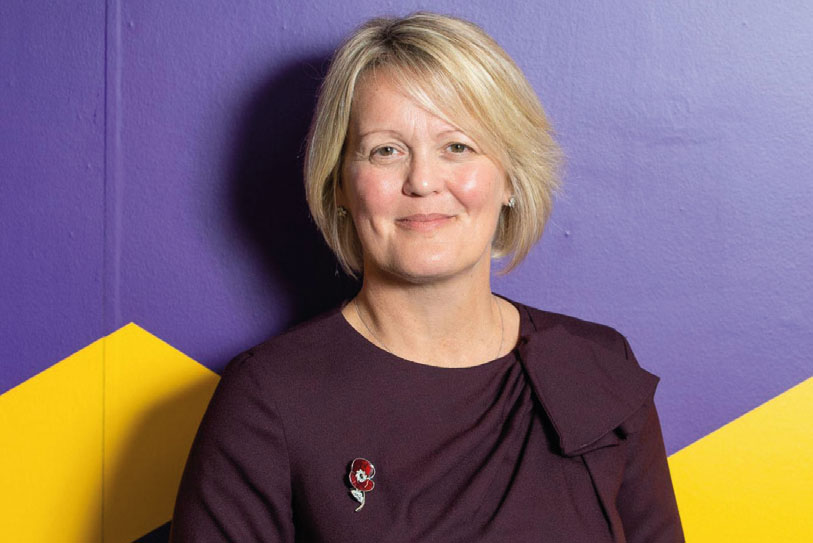
Dame Cressida Dick’s tenure as the Metropolitan Police Service (MPS) Commissioner came to an end with her dramatic resignation in February 2022. Did she jump, was she pushed or did she fall down the stairs? People who were quick to criticise her controversial time at the head of the most widely-known police force in the world, suddenly did a volte-face and started blaming the male individuals, culture and politics to which the Commissioner of the MPS must duck and dive through in order to do their job.
Where did it go wrong? Did it ever go right? And can anyone actually fix the toxic nature pervading through so much of the MPS culture – a culture which others still are saying led to her resignation.
Cressida Rose Dick was born in Oxford in October 1960, the third of three children. Her father, Marcus, was a tutor at Oxford University. He died when Cressida was 10. Her mother, Cecilia was an Oxford historian. Cressida herself gained a BA in Agriculture and Forest Sciences at Balliol College, Oxford.
She joined the Met Police as what was known then as a WPC in 1983 (the ‘W’ or ‘Woman’ prefix was made obsolete in 1999). Apart from six years at Thames Valley Police and a couple of years at the Foreign Office – Dame Cressida spent her entire police career within the Met.
At every stage of her career-promotion, from Constable all the way to the very top, Cressida Dick was “The first woman in the Metropolitan Police Service to…” At virtually every level, she led the way for women within the police force.
She ultimately rose to the rank of Commissioner of the Metropolitan Police - the highest-level police rank
in England – in 2017, upon the recommendation of then Home Secretary Amber Rudd. In England, Her Majesty, The Queen appoints the Commissioner, upon the recommen-dation of the Home Secretary, in consultation with the Mayor of
London.
COMMISSIONER OF POLICE – A POISONED CHALICE?
Policing in the UK is ‘by consent’. This is a long-standing, nationwide philosophy going back to the days of Robert Peel when he started the MPS in 1829. It has always been accepted to mean that the police base their legitimacy on having the confidence of the public, rather than imposing order through sheer force alone.
The London Met has a long and illustrious history. However, there are some aspects of it that it has struggled to come to terms with. Even in relatively recent history, protection rackets run by Met officers were being offered to Soho shops selling adult material; Operation Countryman – a four-year investigation into corrupt officers - was thwarted at every turn by the then Commissioner McNee and the then DPP. There was the MacPherson report of 1999 into the murder of Stephen Lawrence, which was damning of the police as ‘institutionally racist’. And on, and on.
It’s into this bear pit that Cressida Dick – or any Commissioner - has had to step into and seek to resolve all the ills associated with the worst aspects of policing. The Commissioner, upon taking up their role, has a political (with a small ‘p’) choice to make - where there is conflict, do they show loyalty to their officers, or to the general public? For all the while there are - to use a Hastingsism here - ‘bent coppers’, the idea of ‘policing by consent’ will hold only the merest of credibility to the general public.
The situation has been made so much worse for every police force by the then Home Secretary Theresa May’s decimation, not just of police officers, but of support staff, the CPS and the judicial system as a whole. 21,000 police officers were lost to police budget cuts from 2010 to 2015, and London suffered as badly as any force in England and Wales.
With budgets stretched, the notion of community policeman - the ultimate in ‘policing by consent’ - was seriously under threat. And that, especially according to five of Dame Cressida’s predecessors as Commissioner in a 2019 joint letter to The Times, set a dangerous precedent.
At every turn, the MPS, probably against its will, is being more stretched and more politicised - whether from within or without, whether from MPs or from the public. The trick is to keep the public, politicians AND the serving officers on board with Peel’s philosophy of ‘policing by consent’.
Obviously, Dame Cressida is not personally responsible for the corruption carried out by her officers, whether individually nor institutionally. Nor can she be any way blamed for the behaviour of the likes of Wayne Couzens, the serving MPS officer found guilty of the rape and murder of Sarah Everard in 2021. That would be ludicrous.
But she did sit at the summit of a police force which, after so many reviews calling the service ‘Institutionally racist’ (the 1999 MacPherson report into the murder of Stephen Lawrence), ‘institutionally corrupt’ (the 2021 O’Loan report into the 1987 murder of Daniel Morgan), ‘disgraceful’ (the 2022 Sal Naseem / IOPC report into the behaviour of officers at Charing Cross police station from 2016-18), and for which she has had to apologise so many times.
Ultimately, her resignation was seen as being more at the political end of the scale. It was brought about by her losing the confidence of the Mayor of London, Sadiq Khan. The Naseem report on behalf of the Independent Office for Police Conduct (IOPC) into the behaviour of some PCs at London’s Charing Cross Police Station, where racism, misogyny, discrimination and corruption dating back to a period between 2016 and 2018, was damning in itself. However, the London mayor –whose office the Commissioner for the MPS must report to – wasn’t satisfied with Dame Cressida’s response into how this was going to be remedied.
A little surprisingly, the political fall-out of her resignation has not strictly fallen across gender nor party lines. While much finger-pointing has been made towards Sadiq Khan for the straw which broke the camel’s back, some Conservatives – especially those caught up in Operation Midland – were happy to see her go. Other Conservatives have criticised Khan’s behaviour (‘it should have been done behind closed doors’ complained one Tory backbencher), though the opinion on her resignation itself has been left hanging.
Where the story does seem to edge towards party political lines is the Met being seen to be too close, and hence reluctant, to investigate the alleged parties at No.10 Downing Street while the rest of the country was on lockdown in 2020 and 2021.
Here, to have what appears to be one rule for some, and none for others, the MPS has done the one thing it should never be allowed to do - it has taken on the appearance of taking sides. The original decision not to investigate looks from the outside dangerously political - and it was one taken by Dame Cressida herself.
This has been seen as damaging to those high up in government who wished to keep the story quiet, the MPS, and Dame Cressida herself. It certainly didn’t help with her standing with the general public.
The vigil on Clapham Common following the murder of Sarah Everard clearly breached the notion of policing by consent. While technically, the vigil broke lockdown rules, the reaction of the police attending appeared heavy-handed, and was much criticised – including by the Home Secretary, Pritti Patel. A report later cleared the Met of any wrong-doing. However, as they are being sued, this story is now sub judice; it’s probably wise to leave it there for now.
LOYALTY IN THE RANKS
With her own charge sheet being a long as it is, how did Dame Cressida Dick, with so many people offering up intense criticism of her personally, and the Met generally, manage to stay in her job so long?
One major point - often overlooked – is that, of all the MPS officers who are out there, the vast majority serve the public with the correct professionalism, diligence and integrity expected of those in the position. Unfortunately, far too many commentators would have you believe otherwise.
And those officers, the ones whose stories aren’t heard; the ones we don’t hear about, or maybe even are taken for granted, find the support coming from the top of the service very helpful and re-assuring. Within all ranks of the MPS, the support for Dame Cressida has been loyal and solid. They see her as a good person, a caring leader, and ‘one of them’.
Dame Cressida Dick is a copper – a copper’s copper, even.
For all the negativity surrounding her leadership, one story which bucks the ongoing critical narrative is of Dame Cressida’s care for her rank and file officers; someone who would take time out for those within the service. A serving female police officer - a constable – from outside the Met was married to a serving MPS officer.
The wedding was in 2017, but sadly the husband succumbed to cancer in early 2021. Around this time, the widow was asked if she would take a phone call from ‘Commissioner Cressida Dick’.
“Hello, Alison*. Cress, here. I’ve heard about your situation, and David’s* passing, and wanted to offer my fullest condolences to you…”
“Er… good afternoon, Ma’am”
“Oh, don’t call me Ma’am. Call me Cress…”
They then had a half hour’s chat about everything from loss, to life, love, football, and all points in-between. That the Commissioner of the Metropolitan Police Service would take out half an hour of their day to console a police officer at the time of their most savage emotional pain is testimony to a leader who clearly cared for her fellow professionals.
They finished the call by Dame Cressida saying that “… you have my phone number, Alison*. Do call me any time you need me.”
“Is that a good idea, Ma’am, er… Cress? I could end up drunk-texting you late at night, or my backside accidentally call you…”
“Ha, ha! No, keep my number. I’d be happy to have a chat with you again, if you’d like to.”
And she did. Later in the year, Alison* was invited to join the senior officers at Westminster Abbey for the force’s annual Carol service. Carols weren’t really her thing, but she appreciated Dame Cressida’s support and care enough that she happily accepted.
The loyalty which Dame Cressida engenders in her officers, given that she also oversees the country’s counter-terrorism, security for the Royal family, and an unwilling political pawn, has led to many - if not the majority - of those officers to be angry and upset about what they see as her enforced resignation.
The Charing Cross report scandal, and the subsequent resignation of Dame Cressida Dick, have been deeply damaging for a variety of reasons, depending on the viewpoint on which you stand. As one former, well-respected officer put it, having taken the temperature among serving officers, commented, “All looking to leave policing except the last few who are pension trapped. This has really damaged morale.”
Conversely, there are those among the force who believe Dame Cressida was too defensive of the Met, and not focused enough on communicating the depth of its ongoing cultural issues.
The Met’s response, especially after Charing Cross report, is to ask Baroness Louise Casey, a respected public policy trouble-shooter, to hunt down ‘bad attitudes’ within its ranks - and get rid of them.
She was due to start in 2021, but ill-health has delayed her work. One issue she is expected to deal with early on is that it can be difficult to get rid of bad officers. Police employment rights are well protected, partly as a counter-balance to the fact that police in the UK are not allowed to go on strike.
It was felt by many that, between them, Casey and Dick would have been effective in getting on with that particular job. Now that task will have to fall to Dick’s successor.
TRAILBLAZER
Dame Cressida Dick resigned her post in February 2022, though will remain in place until her successor is found, and she can ensure a smooth handover.
She inherited an impossible job, maybe even a toxic job, one which most of her predecessors have failed to effectively come to grips with - and almost certainly one which many of her successors will also struggle with.
In the final analysis, while her errors and subsequent apologies have dominated the headlines, her credits and ‘successes’ in the police force are shamefully overlooked. In 2001, she introduced the diversity directorate within the Met. In 2003, she was tasked with heading up Operation Trident, which specifically investigated gang- and gun-related crime. As head of the unit, she was credited for reducing crime among so-called ‘Yardie drug gangs’.
She was put in charge of security for the London 2012 Olympics - a major international event, utilising 40,000 security personnel from many services. Police officers were encouraged to mingle and join with the crowds, and faith and respect in the police by the public was reinforced. The Games passed off largely without incident.
Cressida Dick was awarded the Queen’s Police Medal in the 2010 New Year’s Honours List, and she was appointed a Commander of the Order of the British Empire (CBE) in 2015 for services to policing. In 2019, she was promoted to Dame Commander of the Order of the British Empire (DBE) in Theresa May’s resignation honours.
That Cressida Dick, as a woman; indeed as a homosexual woman in the Metropolitan Police Service, rose through the ranks to head an institution both revered and yet troubled in a history of over sexism is an absolutely astonishing achievement. This should never be overlooked. Indeed, it should be celebrated.
* Not their real names.




